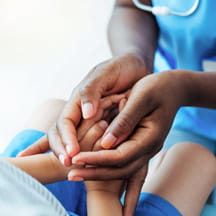COVID-19 has affected nearly every aspect of life, and the annual rite of kids going back to school is no different. While much of the focus this fall will be on protecting children from contracting the virus, the pandemic's effect on the behavioral health of kids returning to school-as well as those who still can't be overlooked.
Children's Hospitals Today caught up with Fatima Watt, Psy.D., director of behavioral health services at Franciscan Children's in Brighton, Massachusetts, to discuss how behavioral health experts can help parents approach this difficult back-to-school season.
As kids around the country head back into classrooms-or in many cases, begin classes remotely from home-what are your primary concerns from a behavioral health perspective?
My concern is high for both groups-those going back in person as well as those learning remotely-because it's about how kids perceive those situations. Some kids may be really excited about going back to school and when they find out they're all remote, it's very disappointing. Some kids are very anxious about going back to school in person because of the fear of getting sick or getting someone in their household sick.
My biggest concern is about the potential for kids to have a traumatic stress reaction in response to everything that's been going on. Kids are generally resilient, but COVID-19 is a trauma. It can depend on many factors: a child's natural resources, if they've been through a trauma before or how their parents are coping. All of these can affect whether they come out of this rather resilient or whether they're going to start to show signs of traumatic stress.
Even in a regular year, we see kids starting to get more anxious and depressed as the school year starts to approach. In the time of COVID, that's going to be heightened. It's going to be important for teachers and parents to be communicating effectively about children's mental health.
For teachers and parents-as well as behavioral health professionals-it would seem helping kids cope with COVID will be much different than previous traumatic events, such as 9/11. What kind of challenges does this pandemic present for the mental well-being of children?
Pandemics are much different from other types of natural disasters or dramatic events that have happened. Part of the challenge right now is that we're still in it. For something like 9/11, it happens and then you can focus on the recovery phase and getting back to baseline. But because we're still in the pandemic, everyone's baseline has shifted.
For my job as a mental health professional, I'm working with families to figure out what options are going to work best for them in their specific circumstances-it's so individualized. Families really need to take the time to weigh all the pros and cons about the choices they have for going back to school.
As you look into the future and envision the post-COVID landscape, how do you anticipate the pandemic will affect the long-term behavioral health of this generation of children?
The majority of kids will return to their previous level of functioning when the pandemic ends. They'll rejoin school and community activities without too much difficulty. There's going to be a subset of kids who struggle and will come out of this with a level of trauma that's going to need more support long term. I have no way of predicting who those kids might be, but there are some circumstances that can be protective for kids:
- Abundant community support
- Calm and reassuring parents
- Parents who check in and talk with them regularly
- Engaging in positive activities
- Continuing to work toward meeting developmental milestones
Those protective factors will help children come out relatively okay on the other side. But there are children who are more likely to panic and distress themselves: those who have less social support, kids who have caregivers who are more anxious and those who may have experienced a death or loss as a result of COVID-especially if that was a caregiver. I worry those kids will have a more traumatic response and will need more support long term to get through the aftermath of the pandemic.
For more information, listen to Watt's webcast related to this topic.


